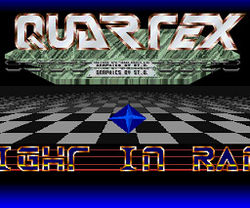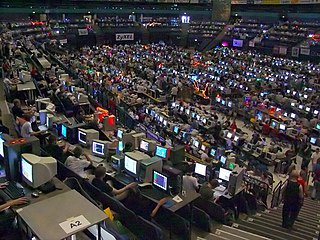
Amiga demos are demos created for the Amiga home computer.

A crack intro, also known as a cracktro, loader, or just intro, is a small introduction sequence added to cracked software. It aims to inform the user which "cracking crew" or individual cracker removed the software's copy protection and distributed the crack.

Demogroups are teams of demosceners, who make computer based audio-visual works of art known as demos. Demogroups form a subculture collectively known as the demoscene.

The demoscene is an international computer art subculture focused on producing demos: self-contained, sometimes extremely small, computer programs that produce audiovisual presentations. The purpose of a demo is to show off programming, visual art, and musical skills. Demos and other demoscene productions are shared, voted on and released online at festivals known as demoparties.

Future Crew was a Finnish demogroup that created PC demos and software, active mostly between 1987 and 1994.

The Assembly demoparty is a demoscene and gaming event in Finland. It is the biggest demoscene party. The main organizers of the event are Pekka Aakko and Jussi Laakkonen. The Summer event takes place every year between late July and early August, and lasts three to four days, and the Winter event is held in January or February. Edition 2020 was online. The most recent Assembly was held from 3 to 6 of August 2023 at Messukeskus in Helsinki.
Farbrausch, or Farb-rausch, is a German group of demomakers who became well known in the demoscene in December 2000 with a 64k intro called "fr-08: .the .product". The demo achieved its small size through the use of procedural textures, a custom MIDI-based software synthesizer V2, and a modified version of UPX executable compressor, ".the .product" is an 11-minute 3-D show featuring complex scenes of computer generated imagery.
tAAt is a Finnish humor-based demogroup founded in 1992 which is active in participating and organizing demoscene events. They are recognized outside of the demoscene for their Dismount series of computer games, including Stair Dismount (Porrasturvat), Truck Dismount (Rekkaturvat) and Dismount Levels.
Melon Dezign is an Amiga demos group formed in 1991 by original designer Seen and Paleface, the developer. Originally, they were a subgroup of Crystal, for which they made intros for cracked games. Melon Dezign was first demo group to introduce a visual identity—the famous black and white logo is present on all intros and demos and became the most recognizable part of the group. They are considered one the most influential Amiga groups of the early 1990s and were integral to the development of the demo counterculture and the recognition of demo as an art form.

Second Reality is an IBM PC compatible demo created by Future Crew. It debuted at the Assembly 1993 demoparty on July 30, 1993, where it was entered into the PC demo competition, and finished in first place with its demonstration of 2D and 3D computer graphics rendering. The demo was released to the public in October 1993. It is considered to be one of the best demos created during the early 1990s on the PC; in 1999 Slashdot voted it one of the "Top 10 Hacks of All Time". Its source code was released in a GitHub repository as public domain software using the Unlicense on the 20th anniversary of the release on 1 August 2013.
Tristar and Red Sector Incorporated (TRSI) is a demogroup which formed in 1990. It came about from the longest-running cooperation in scene history. RSI existed from 1985, before being joined by the "T" later on. Evolving from the Commodore 64 to the Amiga and later to PC and various game console platforms - like the PlayStation, Xbox, Nintendo - and set-ups like Arduino, Android or Blu-ray, TRSI released a number of digital productions, dedicated to experimenting in phreaking or network alteration. Its members were spread around the world and still contribute to computer scene art and code after more than 27 years of history.

PARADOX (PDX) is a warez–demogroup; an anonymous group of software engineers that devise ways to defeat software and video game licensing protections, a process known as cracking, which is illegal in most jurisdictions. They distribute cracks, keygens, and pre-cracked versions of entire programs. Over the years, distribution methods have changed, starting out with physically transported floppy disks and BBS distribution. Today most of their files reach the public over various peer-to-peer file networks.

Hugi is one of the longest lasting, frequently released demoscene and underground disk magazines (diskmag) for IBM-PC.
Triton (TRN) was a demogroup active in the PC demoscene from 1992 to about 1996.
Spaceballs is an Amiga demogroup from Norway, originally based in the city of Halden. It was formed in 1987, but did not make its first release until 1989.
European Top 20 was a disk magazine and scene chart for the Commodore Amiga published by the demo scene group Equinox. The first issue was published in July 1992 and the last in July 1993.

Razor 1911 (RZR) is a warez and demogroup founded in Norway, 1985. It was the first ever such group to be initially founded exclusively as a demogroup, before moving into warez in 1987. According to the US Justice Department, Razor 1911 is the oldest software cracking group that is still active on the internet. Razor 1911 ran the diskmag 'Propaganda' until 1995.

Kindergarden (KG) is an annual demo party first organized in 1994 in Fjellfoten, Norway. During the first few years it was held irregularly, eventually settling into being an annual event. Since 2001 it has been held in Haga, Norway, the location also used for Kindergarden 4 and 5.
Phenomena (PHA) was a Swedish Demogroup making Amiga demos that was productive during the formative years of the Amiga Demoscene founded in 1987.






